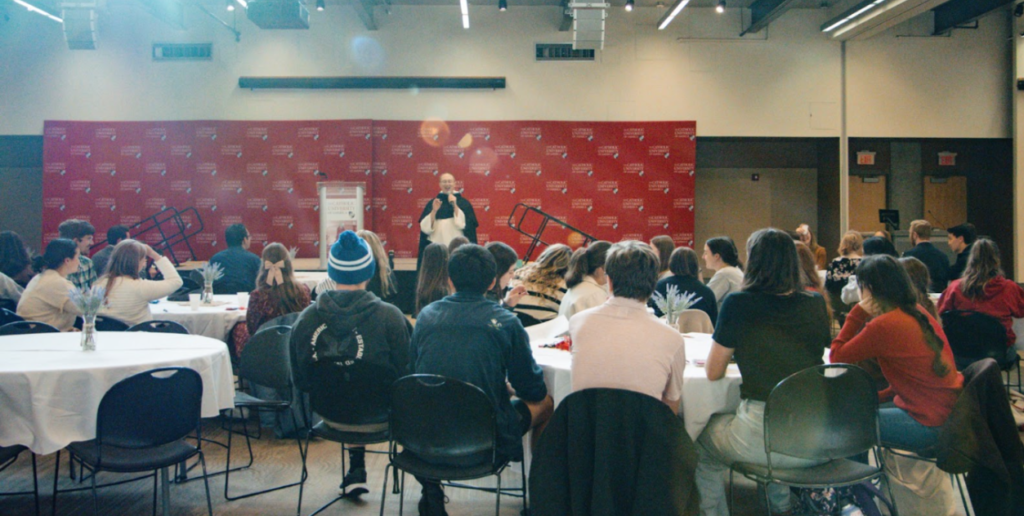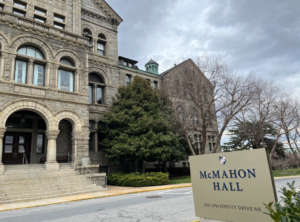Chaplain’s Talk: Jesus, Our Emmanuel

Image Courtesy of Isabel Fay
By Zachary Lichter
Father Joseph Hagan, the Chaplain for Undergraduate Formation, gave a talk on November 17 titled “Jesus Our Emmanuel.”
The event began at 2:30 p.m. in the Pryzbyla Center Great Rooms. As people walked in, they were given a handout that contained an outline of his talk to help them follow along. Father Joseph began his talk with a prayer.
“Jesus is Our Emmanuel” means “God is with us.”Father Joseph chose this topic for three reasons; the first is because he thinks it’s easy to believe that Jesus Christ is always with us and loves us.
The second reason is that this topic comes up repeatedly in the New Testament. In the Gospel of Matthew in St. Joseph’s dream, the word “Emmanuel” is used, and towards the end, when Jesus says, “I am with you always.” It also comes up during the Last Supper and when Jesus prays for us to be with Him before the Passion in the Gospel of John.
Additionally, it’s seen in the Book of Acts from the letters of St. Paul and the Book of Revelation when God reveals all of human history and the bride walks down from heaven. Father Joseph said that repeatedly hearing these passages is important because Jesus may have more to tell people that they need to know.
The third reason is that Jesus’ enduring presence is one of the deepest desires of the human heart. People may ask themselves: Am I enough? Am I chosen? But the deepest question people ask is: Am I alone? Is someone who loves me with me?
Father Joseph gave two examples of how the deeper question can be applied. One that he used pertains to when babies silently ask if someone is there when they cry. Another example employed was when a six-year-old falls off their bike and scrapes their knee, they are screaming “Mom” instead of “Why is my suffering horrible?” These two scenarios helped explain why people ask themselves if someone there loves them.
Father Joseph pointed out that everyone has deep desires for Jesus. People deeply desire someone who knows and loves them to be with us. But he wants people to be gentle with their hearts, to know that the answer is Jesus, and to know that life will be messy until they go to heaven.
Father Joseph explained that there are four tests of a person’s faith in Emmanuel, beginning with someone sinning, especially if the person is not in a state of grace. The second test is feeling shame, where a person runs away from God because it still plumes around their memory even after going to Confession.
The third is when a person feels lonely or doesn’t want to be with themselves or others. The fourth is that God is silent, and people read their doubts into His silence.
The last part he mentioned was Holy Practices, which are studying scripture and Holy Memories; he said to think of a time when God has answered a person’s prayer.
Prayer is another Holy Practice expressed through an ongoing conversation with Jesus alone during Mass or the Liturgy of the Hours. Another Holy Practice he mentioned was choosing gratitude instead of self-pity. Most people think that they deserve to be pitied, and this is sometimes when alcohol is used for pity, but praying the Rosary is a better alternative.
Confession is a Holy Practice because a person is shocked by their sin of the past. The last Holy Practice Father Joseph mentioned is the Eucharist because Jesus gives people His true presence.
Caitlin Farley, a freshman politics major, commented on how Jesus is Our Emmanuel.
“I think especially in the beginning when he was talking about that it’s always true that really hit the nail in the head for me,” Farley said. “It made me really feel that God is always with me.”
Ryan Corey, a junior philosophy major, commented on how Jesus can become our Emmanuel during Advent.
“I thought it was a very good reflection of Jesus as our Emmanuel and all the ways that He dwells our life and calls us to go deep to dwell with him more and bring us into the life of the Trinity,” Corey said. “It is something really important to reflect on as we approach the end of Ordinary Time, especially during the season of Advent where we are called to think of Jesus as our Emmanuel in the very real sense.”







